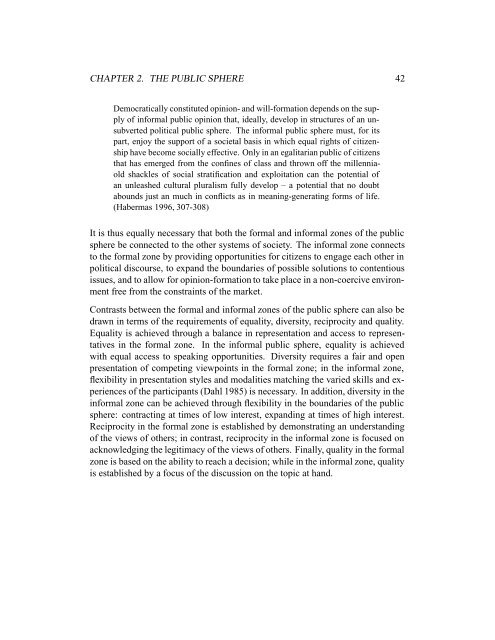Expanding the Public Sphere through Computer ... - ResearchGate
Expanding the Public Sphere through Computer ... - ResearchGate
Expanding the Public Sphere through Computer ... - ResearchGate
Create successful ePaper yourself
Turn your PDF publications into a flip-book with our unique Google optimized e-Paper software.
CHAPTER 2. THE PUBLIC SPHERE 42<br />
Democratically constituted opinion- and will-formation depends on <strong>the</strong> supply<br />
of informal public opinion that, ideally, develop in structures of an unsubverted<br />
political public sphere. The informal public sphere must, for its<br />
part, enjoy <strong>the</strong> support of a societal basis in which equal rights of citizenship<br />
have become socially effective. Only in an egalitarian public of citizens<br />
that has emerged from <strong>the</strong> confines of class and thrown off <strong>the</strong> millenniaold<br />
shackles of social stratification and exploitation can <strong>the</strong> potential of<br />
an unleashed cultural pluralism fully develop – a potential that no doubt<br />
abounds just an much in conflicts as in meaning-generating forms of life.<br />
(Habermas 1996, 307-308)<br />
It is thus equally necessary that both <strong>the</strong> formal and informal zones of <strong>the</strong> public<br />
sphere be connected to <strong>the</strong> o<strong>the</strong>r systems of society. The informal zone connects<br />
to <strong>the</strong> formal zone by providing opportunities for citizens to engage each o<strong>the</strong>r in<br />
political discourse, to expand <strong>the</strong> boundaries of possible solutions to contentious<br />
issues, and to allow for opinion-formation to take place in a non-coercive environment<br />
free from <strong>the</strong> constraints of <strong>the</strong> market.<br />
Contrasts between <strong>the</strong> formal and informal zones of <strong>the</strong> public sphere can also be<br />
drawn in terms of <strong>the</strong> requirements of equality, diversity, reciprocity and quality.<br />
Equality is achieved <strong>through</strong> a balance in representation and access to representatives<br />
in <strong>the</strong> formal zone. In <strong>the</strong> informal public sphere, equality is achieved<br />
with equal access to speaking opportunities. Diversity requires a fair and open<br />
presentation of competing viewpoints in <strong>the</strong> formal zone; in <strong>the</strong> informal zone,<br />
flexibility in presentation styles and modalities matching <strong>the</strong> varied skills and experiences<br />
of <strong>the</strong> participants (Dahl 1985) is necessary. In addition, diversity in <strong>the</strong><br />
informal zone can be achieved <strong>through</strong> flexibility in <strong>the</strong> boundaries of <strong>the</strong> public<br />
sphere: contracting at times of low interest, expanding at times of high interest.<br />
Reciprocity in <strong>the</strong> formal zone is established by demonstrating an understanding<br />
of <strong>the</strong> views of o<strong>the</strong>rs; in contrast, reciprocity in <strong>the</strong> informal zone is focused on<br />
acknowledging <strong>the</strong> legitimacy of <strong>the</strong> views of o<strong>the</strong>rs. Finally, quality in <strong>the</strong> formal<br />
zone is based on <strong>the</strong> ability to reach a decision; while in <strong>the</strong> informal zone, quality<br />
is established by a focus of <strong>the</strong> discussion on <strong>the</strong> topic at hand.
















